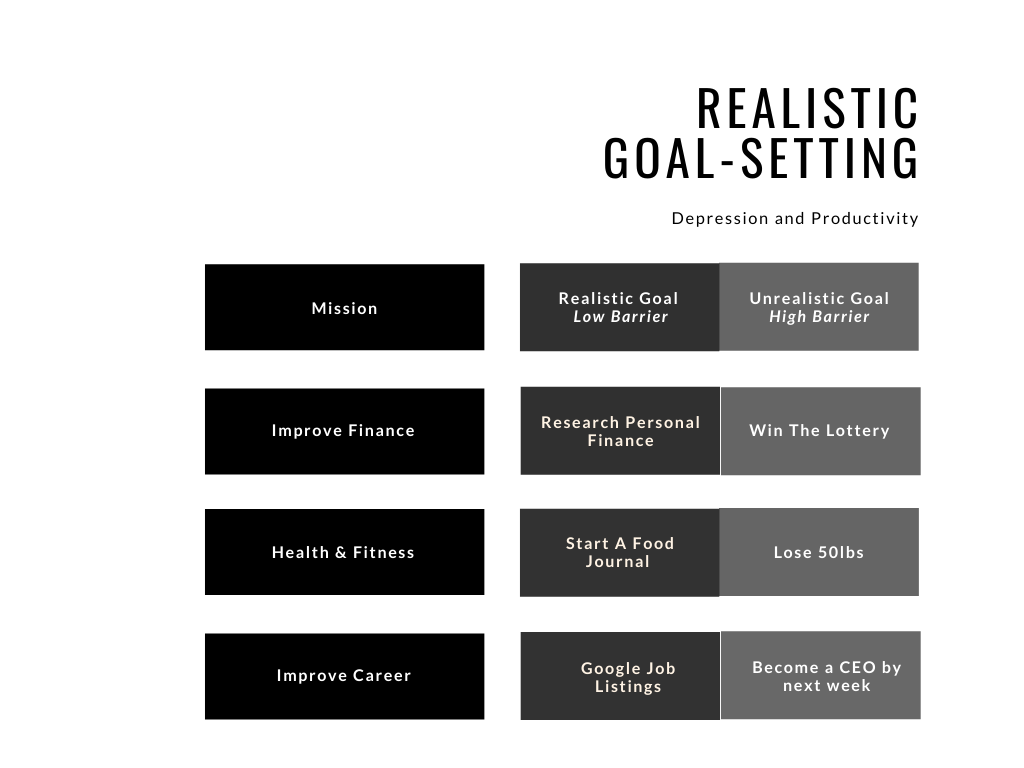
Pleasant Productivity
Module IV | Session Three
Session Overview
M4 | Session Three: Pleasant Productivity
If you are feeling thoughts of self-harm please dial your relevant crisis number here.
|
Defining Productivity
Depression and Productivity
Realistic Goal-Setting
Session Skill: Building Mastery
|
What Is Productivity?
Productivity generally refers to the ability of an individual, team, or organization to work efficiently within [a set] time in order to maximize output.
Source: Psychology Today

Depression and Productivity
High productivity results from a mix of factors:
Motivation, personality, natural talent, training education, environment, support from others, time management, and even luck.
Physical elements also play a role in fostering productivity:
Exercise, healthy eating, and sufficient sleep can boost efficiency both in the short- and long term. Some people seem to be natural super-producers.
Some people struggle to become more productive and may look to daily exercises and better habits to help them get things done. An individual's productivity hinges on mental energy and a sense of internal and external motivation.
Productivity often emerges naturally from work that we find inherently meaningful or valuable. While not everything one must do each day can hold deep personal meaning, researchers find that maintaining a focus on a larger long-term goal can help activate the drive and energy.
Source: Psychology Today
How To Set Realistic Goals
Often, when we are in the midst of feeling down, we think of all the ways in which we have not been productive, and we can "beat up on ourselves" for it. What we often need is balance! SMART goals are a method of goal setting that ensures our goals are manageable and attainable.
S.M.A.R.T Goal Setting
|
Specific
Your goal should be clear and specific.
Answer the 5 Ws.
(Who, What, Where, When, Why)
|
Measurable
Set up a metric of the goal.
Answer How or How Much
($, %, cm, kg, lbs, #)
|
Achievable
The goal should stretch your abilities but still remain possible.
Write down how you will accomplish this goal?
|
Relevant
Make sure your goal matches your values
Questions To Ask:
(Is this worthwhile? Is this the right time? Does this match my needs?
Am I the right person to do this? Is this applicable to my life?)
|
Time-Bound
Set a realistic target date, so that you have a deadline to focus on.
Answer these questions:
(When? What can I do six months from now?
What can I do six weeks from now? What can I do today?)
Source: MindTools.com
Session Skill
Building Mastery
Feelings of insufficient productivity lowers our confidence and may reinforce negative inner voices in our thoughts. On the other hand, when on an upswing, we can set lofty goals and plan to "take over the world" with our tasks. We set expectations too high and are deeply disappointed, when we, or our circumstances, fall short of these expectations. Further, a sudden burst in effort can deplete us and send us spiraling back down into burnout.
By using the steps below, you can begin to build your mastery of tasks which will rebuild your confidence and thus improve your productivity over time.
|
STEP 1
Plan on doing at least one thing each day to build a sense of accomplishment.
Example: Make Bed
|
STEP 2
Plan for success, not failure.
Do something difficult, but possible.
|
STEP 3
Gradually increase the difficulty over time.
If the first task is too difficult, do something a little easier next time.
|
STEP 4
Look for a challenge.
If the task is too easy, try something a little harder next time.
